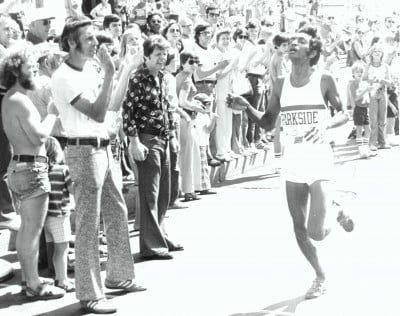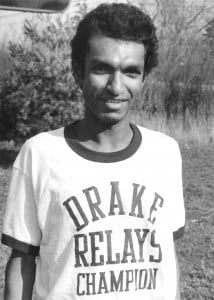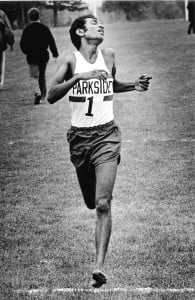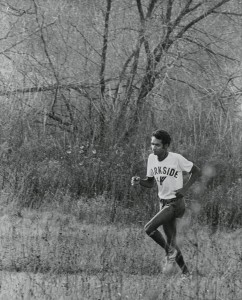The Untold Story of Lucian Rosa – University of Wisconsin-Parkside Star Denied Chance in 1976 Olympic Marathon
1970s standout Lucian Rosa still haunted by lost Olympic dreams
By John Kissane
August 20, 2016
Tears quickly well up in the eyes of 72-year-old Lucian Rosa as he thinks back on the 1976 Montreal Olympics. Rosa, then a citizen of Sri Lanka, was a medal contender in the marathon. He had finished fourth at Boston in 1974 and 11th at Fukuoka – then considered the unofficial world championship — in December of 1975, and he was fit and confident upon arrival in Montreal a few days before the Games began.
But Rosa never made it to the starting line, never ran what he believed would be his best marathon. It is a tale of politics and unscrupulous officials combining to preempt sport and diminish the career of a remarkable athlete. And while Lucian Rosa’s spirit has recovered, he still wonders what might have been.
Sellapuliyage Lucian Benedict Rosa was born in Kandy, Sri Lanka’s second-largest city, on February 11, 1944. His childhood in the South Asian island nation, known until 1972 as Ceylon, was difficult. Rosa was only three when his father died of pneumonia. His mother remarried, and the young boy was soon subjected to harsh treatment by an abusive stepfather. One night in 1961, at the age of 17, Rosa climbed out of his bedroom window and left home for good, eventually to join the Ceylonese army.
Although he expressed a desire to run for the army, the 5’6”, 98-pound teenager was initially sized up as a wrestling prospect. But in 1965, when finally given a chance to display his running talents, Rosa defeated Olympian R. J. K. Karunananda to win a national title at 5,000m at the age of 21, and his future brightened.
Rosa was named to Ceylon’s 1968 Olympic team, but the financially strapped nation elected to send only three athletes to Mexico City and Rosa stayed home. His luck changed again two years later, after he triumphed at both 5,000m and 10,000m at the 1970 Asian Games in Bangkok, Thailand. There Rosa was spotted by Tom Rosandich and Bob Lawson, athletic director and track coach, respectively, at the University of Wisconsin-Parkside. Rosandich and Lawson were assisting with several of the Asian teams that summer, and they convinced Rosa to accept a scholarship to Parkside, then an NAIA [National Association of Intercollegiate Athletics] school.
“The coaches said, ‘Hey, you are not a 5,000-meter/10,000-meter guy. You’ve got to get into marathoning,’” Rosa recalls. “That’s what sold me on coming to the U.S.” Unlike the NCAA, the NAIA track and field championships include the marathon event, and after arriving in Wisconsin in the summer of 1971 Rosa began working with Parkside cross country and distance coach Vic Godfrey, increasing his mileage and learning about running shoes. The former came more easily than the latter.
“Lucian came here a barefooted runner,” explains Godfrey. “His first marathon was at North Central College in Naperville [Illinois] on a cold December morning. We thought we had him comfortable running in shoes, but suddenly he took them off around mile 19.”
Rosa continues the story. “Two guys had passed me and the shoes were heavy, so I took them off. It was 20 degrees with a little snow on the ground, and the last six miles it was like running in a freezer. I didn’t feel anything from the knees down.” Predictably, Rosa faded badly, finishing 16th in 2:48. “After that,” he laughs, “I learned to run with shoes.”
Rosa’s second marathon, at the 1972 Drake Relays, went much better. He won by three minutes over 1968 U.S. Olympian Ron Daws in 2:22:13, a new Drake Relays standard and Sri Lankan national record. On the track that spring and in subsequent years, Rosa proved one of the nation’s finest collegiate runners, battling it out with NAIA standouts such as 1972 Olympic 800m bronze medalist Mike Boit and Boit’s Eastern New Mexico teammate Philip Ndoo, both Kenyan.
Sri Lanka tabbed Rosa to run the 10,000m and marathon at the 1972 Munich Olympics and instructed him to attend a 10-week training camp in Germany leading up to the Games. “It was a big mistake,” Rosa says. “My training went haywire and there were too many competitions.” Rosa struggled in his Olympic 10,000m heat and failed to advance to the final. By the time the marathon rolled around he was sick with the flu and could not finish.
Rosa also recalls a 1972 incident that he believes precipitated his heartbreak four years later. A group of Sri Lankans in New York sent $3,000 to Munich in support of their nation’s small cadre of athletes, and they asked Rosa to be sure it got to the athletes. “But not a penny was given to any of the athletes,” he says. “Somehow this got in a newspaper, and the Sri Lankan officials thought I had leaked the story. So they didn’t even invite me to compete in the 1974 Asian Games.”
Returning to Wisconsin in the fall of 1972, Rosa went on a four-year tear. He won several NAIA championships, including the 1973 and 1974 marathon titles, and also triumphed again at Drake in 1973 and 1975, the latter in a meet-record 2:18:58 during a thunderstorm. Rosa ran 2:15:54 to place fourth at Boston in 1974 and improved his marathon best to 2:14:31 at Fukuoka in December of 1975. Godfrey was convinced all the hard work would pay off in Montreal.
“He did some virtually superhuman things,” recalls Rosa’s former coach. “Lucian ran more than 25,000 miles in the five years we worked together (editor’s note: that’s about 95 miles a week every week of the year if evenly done) , and for several years he got up at 4:00 a.m. to do his job cleaning up a shopping mall parking lot. He’d then run seven miles to Parkside, attend classes, and run a workout in the afternoon if it wasn’t a mileage day. And then he’d run home. When we got to Montreal he was ready to roll. I counted on him being in the top six with a shot at a medal.”
Rosa finished third behind Frank Shorter and Neil Cusack in a Milwaukee 10K on July 4, 1976, and a week later traveled to Montreal with Godfrey and Lawson. Shortly after arriving at the Olympic Village, however, Rosa discovered that a Sri Lankan official had confiscated his credentials and withdrawn his name from the competition.
The official line was that Sri Lanka was boycotting the Games, in support of two dozen African nations refusing to participate alongside New Zealand, whose national rugby team had toured apartheid South Africa earlier in the summer. But to this day Rosa sees things otherwise.
“The boycott was a big lie,” he says. “They just made that up to cover their backs. If Sri Lanka was boycotting, why did they send an official to Montreal? Why did the Sri Lankan flag fly in the main stadium and the Olympic village but no flags of the African nations? I had been the flag bearer for Sri Lanka in Munich; why didn’t they help me run under the Olympic flag in Montreal?
“I believe they didn’t have the money to send anyone,” Rosa continues. “And when they learned that Parkside would pay my way, they got mad and decided to take revenge on me. The Canadian ambassador to Sri Lanka made so many phone calls, saying ‘Let Rosa run.’ But they didn’t listen.”
Rosa stayed in the Olympic village until the Games ended, not running a step those three weeks and barely eating before he, Godfrey and Lawson returned to Wisconsin.
In early September Rosa suddenly left Kenosha for West Virginia, where, grossly undertrained, he battled Montreal silver medalist Shorter and Gary Tuttle to a third place finish in the Charleston Distance Run 15 Miler. It would prove to be his last competitive race, for the next year he replaced Godfrey as head cross country and distance coach at Parkside. In 1982, the same year he became a U.S. citizen, Rosa was promoted to direct his alma mater’s track and cross country program, a position he held until retiring in 2007.
Today Rosa and his wife, Wimala, still live in Kenosha, not far from the Parkside campus. Barely an ounce over his mature racing weight of 104 pounds, he runs up to an hour five or six days a week. “When I was coaching I ran a lot of the workouts with the kids, but I can’t even do one seven-minute mile now,” the 72-year-old laughs.
Despite the Olympic disappointments that still haunt him, Lucian Rosa’s anticipation of the Rio Games — and especially track and field competition — mounted over the summer as the opening ceremony approached.
“I still follow everything about the sport,” he said earlier this month. “I’ll be watching every minute of the Olympics again on TV.”
Footnote: S. L. B. Rosa’s Sri Lankan marathon record of 2:14:31 held up for nearly 30 years. The current national record-holder is Anuradha Cooray, who ran 2:13:47 in London on April 26, 2015. Rosa still holds the Sri Lankan record at 10,000m with a mark of 29:18:0.






